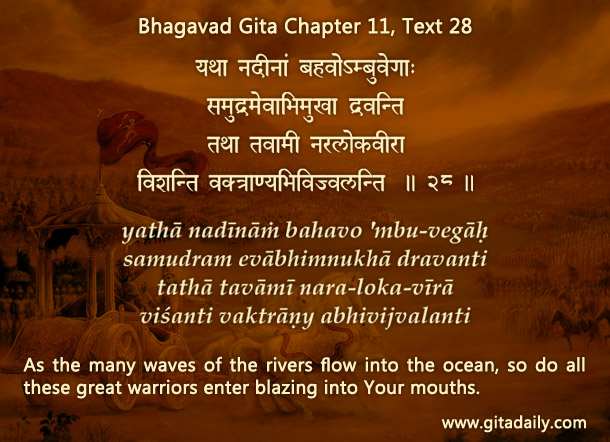3 tools for finding a purpose in our life – When we go through life, it is easy to feel lost, not knowing what we are meant to do as tiny, fragile beings in a massive, messy world. Through spiritual wisdom texts like the Bhagavad Gita, we understand that we are all meant, ultimately, to unite with our divine source in a bond of eternal love. Understanding this universal ultimate purpose of life can be enormously reassuring and energizing because we understand that our existence is not valueless or meaningless and that there is a home calling us at the end of all the trials and troubles of this mortal existence.
Nonetheless, despite having that ultimate destination in mind, we may still feel somewhat lost, not knowing what we are meant to do in this life as we grow in our spirituality and attain the Divine. The Bhagavad Gita (2.70) gives the metaphor of the river reaching the ocean as an example of virtuous souls meeting their end in this life and attaining the ultimate end of life. Just as rivers offer life-sustaining water and benefit all the life forms on their banks along their journey to the ocean, we are meant to contribute to helping others while we go on our spiritual journey.
To understand what we can do, we can consider three ways: looking outward, looking inward, and looking upward.
When we look outward, we can focus on some problem that we feel called to solve or at least driven or drawn to make an endeavor to solve, no matter how minimal our actual impact may be in solving that problem. There are many things wrong in the world, and we certainly can’t fix all of them. We may not be able to fix even one of those things for very long, but even a small positive change that we can make in our small corner of the world can make a big difference for those who live in or pass through that corner of the world. Rather than complaining about the huge number of problems in the world, we can focus on zeroing in on one or a few problems that we feel addressing would be meaningful and satisfying for us.
Then we can look inward and see what potential we have in terms of the abilities, interests, or resources that we can bring to bear in our endeavors to address the problem. While we may feel that we are nothing or that the gifts we have amount to nothing, we shouldn’t give in to such devaluing perceptions. Instead, we need to devalue those devaluing perceptions and focus on the fact that we do have some abilities, even if they may not be extraordinary or earth-shaking. We do have some interests, which may eventually develop if explored and expanded into passions for our life, and we do have some resources, such as health, will, or contacts, that we could leverage in our endeavors.
Then we can look upward. Through prayer, we seek guidance from our Lord regarding how he would like us to serve and contribute. Through prayer, we can articulate in our words our understanding of the problem that we would like to address and the potential that we would like to offer for that purpose. We are all parts of the all-loving Divine and therefore have parts in His divine plan for the welfare of the entire world. We may not get any mystical revelation that brings total clarity about our lives as a response to our prayers. We may instead get just a deepening, soft calmness and clarity as we reflect on our options and take tangible steps, even if small, to explore those options.
Through such exploration, we will eventually progress toward the activities that infuse meaning and value into our life and, indeed, maximize the meaning and value of our life for ourselves as well as for others.
Summary:
- To avoid feeling lost in our life, we need to complement the discovery of the ultimate purpose of life—to unite with God in love—with an intermediate purpose for this life.
- To find a purpose for our life, we can look outward to seek a problem that we feel drawn to address, look inward to notice potentials that we can unleash, and look upward to seek, through prayer, divine guidance.
- Through the combination of looking outward, inward, and upward, we can gradually progress toward increasing calm and clarity about how to bring maximum value and meaning to our life.
Think it over:
- To overcome the feeling of being lost, why do we need an understanding of both an ultimate purpose and an immediate intermediate purpose for our life?
- Look outward to note three problems that draw you to address.
- Look inward to note three potentials that you would love to unleash.
***
11.28 As the many waves of the rivers flow into the ocean, so do all these great warriors enter blazing into Your mouths.


Leave A Comment